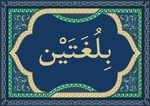المسيح:
الشخص الذي وعد الله بإرساله لينقذ البشر من الخطيئة، ويرشدهم إلى طريق الصلاح، ويملك عليهم إلى الأبد في هذه الدُنْيا وفي الآخرة. يأتي مصطلح «المسيح» من كلمة عبرية تعني "يمسح، يدهن" وهي تعكس عُرفًا قديمًا يقوم على تنصيب شخص ما ملكًا عن طريق مسحه أو دهنه بالزيت. ومع ذلك، لم يُدهَن عيسى بزيت، بل بالروح القدّوس وبالقوة (الإنجيل، لوقا 3:21-22؛ لوقا 4:18؛ أعمال الرسل 10:39). في التوراة، وفي مزامير داود، وفي صُحُف الأنبياء، وعد الله بإرسال ملك خاصّ، أي المسيح، لينقذ ويرشد كل من يؤمن به. يقول كتاب النبي دانيال (7:13-14) إنَّ الله سيمنحه ”سُلْطَةً وَجَلَالًا وَقُوَّةً مَلَكِيَّةً، لِيَعْبُدَهُ كُلُّ النَّاسِ مِنْ مُخْتَلِفِ الشُّعُوبِ وَالْأُمَمِ وَاللُّغَاتِ“. ومن خلاله ”يُقِيمُ رَبُّ السَّمَاءِ مَمْلَكَةً ... تَبْقَى إِلَى الْأَبَدِ“ (دانيال 2:44). وهذه هي مملكة الله.
the Messiah:
the person God promised to send to save people from sin, guide them in the way of righteousness, and rule them forever both in this world and in the world to come. The term Messiah comes from a Hebrew word that means “to anoint” and reflects an ancient practice of installing someone as the king by anointing him with oil. Jesus, however, was not anointed with oil but with the Holy Spirit and power (Luke 3:21-22; Luke 4:18; Acts 10:39). In the Torah, in the Psalms of David, and in the Writings of the Prophets, God promised to send a special king, the Messiah, to save and guide everyone who puts their faith in him. The Book of the Prophet Daniel (7:13-14) says that God would give him “authority, glory, and power as king so that all people would serve him, from the different ethnic groups, nations, and languages.” Through him, God would “establish a kingdom” that “will remain forever” (Daniel 2:44). This is the Kingdom of God.
أعلن عيسى المسيح أنَّ الله سيقيم هذه المملكة من خلاله. وقال إنَّ الله قد أعطاه سلطة على كل شيء (إنجيل متى 28:18؛ لوقا 10:22؛ يوحنا 13:3). وهو قد دعا الناس إلى التوبة والإيمان به حتى يغفر الله خطاياهم، ويغطّسهم في روحه القدُّوس، ويمنحهم حياة الخلود في مملكته المجيدة (الجنّة). وَقَالَ لَهُمْ: ”يَقُولُ الْكِتَابُ إِنَّ الْمَسِيحَ يَتَأَلَّمُ ثُمَّ يَقُومُ مِنَ الْمَوْتِ فِي الْيَوْمِ الثَّالِثِ، فَيَجِبُ دَعْوَةُ النَّاسِ مِنْ كُلِّ الشُّعُوبِ أَنْ يَتُوبُوا لِتُغْفَرَ ذُنُوبُهُمْ بِوَاسِطَةِ اسْمِهِ.“ (لوقا 24:46-47)
Jesus the Messiah proclaimed that God was establishing this kingdom through him. He said that God had given him authority over all things (Matthew 28:18; Luke 10:22; John 13:3). He called people to repent and believe in him so that God would forgive their sins, immerse them in his Holy Spirit, and grant them eternal life in his glorious kingdom (Paradise). He said to them, “The Scriptures say that the Messiah will suffer and then rise from death on the third day, and [that] it is necessary to call people of all ethnic groups to repent so their sins may be forgiven through [faith in] his name.” (Luke 24:46-47)
توقّع معظم اليهود أن تكون مملكة الله، ومَلِكُها، سياسيين ومنظورين من البداية، ولكنَّ عيسى قال إنَّ مملكته ليست منظورة وأنّ مُلكه ”لَا يَنْتَمِي إِلَى هَذَا الْعَالَمِ“ (الإنجيل، لوقا 17:20؛ يوحنا 18:36). بدلاً من ذلك، رفعه الله إلى السماء وأجلسه عن يمينه (لوقا 22:69؛ أعمال الرسل 2:33)، حيث يملك على الأحياء الذين على الأرض وعلى الأموات الذين ذهبوا إلى الجنّة على السواء (1 بطرس 3:22؛ رؤيا 1:5). وقال إنَّه سيعود إلى الأرض في سحابة، مثل البرق، بكل قوة وجلال (لوقا 17:24؛ لوقا 21:27)، وإنّه سيقضي على كل شرّ، ويقيم الموتى (يوحنا 5:28-29؛ يوحنا 6:40)، ويحكم الأمم (الإنجيل، متى 25:31-34؛ أعمال الرسل 10:42؛ أعمال الرسل 17:31)، ويقيم مملكة الله بالكامل.
Most Jews expected the Kingdom of God and its King to be political and visible, but Jesus said his kingdom is not visible and “is not of this world” (Luke 17:20; John 18:36). Instead, God raised him to heaven and seated him on his right (Luke 22:69; Acts 2:33), from where he rules both those living on earth and those who have gone to Paradise (1 Peter 3:22; Revelation 1:5). He said he would come back to earth in a cloud, like lightning, with all power and glory (Luke 17:24; Luke 21:27), and would destroy all evil, raise the dead (John 5:28-29; John 6:40), judge the nations (Matthew 25:31-34; Acts 10:42; Acts 17:31), and establish the Kingdom of God in full.
ولقد تُرجِمَت الكلمة العبرية «مَشِيح» إلى اليونانية بكلمة خْرِستوس، والتي تعني «الممسوح»، ومنها إلى الإنجليزية على صورة Christ، لكنَّ اللغة العربية حافظت على الشكل الأصلي «مسيح».
The Hebrew word for the Messiah was translated into Greek as ho Christos, meaning “the anointed one,” and from there into English as Christ, but Arabic has preserved the original form.
